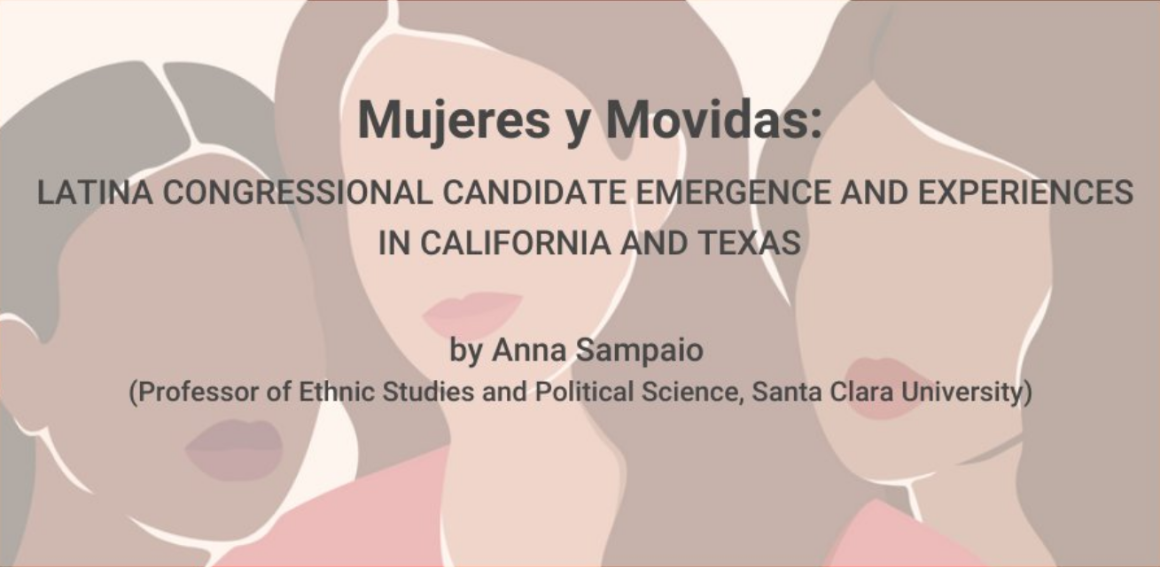
Mujeres y Movidas: Latina Congressional Candidate Emergence
NEW BRUNSWICK, NJ, Sept. 27, 2023—The Center for American Women and Politics (CAWP), a unit of the Eagleton Institute of Politics at Rutgers University, is releasing important new research from CAWP Research Grant recipient Dr. Anna Sampaio, professor of ethnic studies and political science at Santa Clara University. In Mujeres y Movidas: Latina Congressional Candidate Emergence and Experiences in California and Texas, Sampaio explores, through empirical data and interviews with candidates and political professionals, the experiences of Latina congressional candidates in the 2018, 2020, and 2022 elections. She also provides prescriptions founded in this research to enhance Latinas’ political participation and increase the number of Latinas running for office. Additionally, Sampaio will be joined by U.S. Representative Sylvia Garcia and CAWP Director of Research Kelly Dittmar for a virtual discussion about her findings next Wednesday, October 4th at 4 pm ET.
Mujeres y Movidas:
A Conversation About Latina Candidate Emergence
United States Representative Sylvia Garcia (D-TX)
Dr. Anna Sampaio, Santa Clara University
Dr. Kelly Dittmar, CAWP and Rutgers University–Camden
Wednesday, October 4th at 4 pm ET
Key findings from this research include:
- The volume and diversity of Latina congressional candidates grew in 2018, 2020, and 2022. Between 2017-2023, Latina candidates for Congress grew by more than 50% and the number of Latinas elected to Congress as voting members doubled from 10 to 20. While Latina congressional candidates continue to be concentrated in the Democratic party, an increasing number of Latina Republicans ran for office and won, particularly in 2020 and 2022.
- The ascendance of the Trump administration, and particularly the targeting of fundamental rights including immigration and reproductive rights, served as a mobilizing factor for both Latina Democrats and Republicans.
- As the number of Latina candidates running for national office grew in 2018, 2020, and 2022, so too did the number of Latinas running against other Latinas. These intra-racial challenges most commonly occurred in districts where Latina Republicans were advanced as challengers against recently elected Latina Democrats, suggesting a problematic weaponizing of intersectionality.
- California and Texas remain the epicenter of Latina candidate emergence with half of all Latinas who ran for Congress in 2018, 2020, and 2022 emerging from the two states.
- While more Latina congressional candidates have emerged from Texas and their numbers have increased significantly over the past three election cycles – especially among Republicans running in 2020 and Democrats running in 2022 – Latina candidates from California have been far more successful in winning election and re-election to national office.
- Despite partisan differences, Latina congressional candidates in both states shared a number of similar experiences, obstacles, opportunities, and concerns about their campaigns and the election process.
- Recurring themes from these interviews revolved around the significance of race, gender, and intersectionality among candidates’ identities, encounters with discrimination and political hostility, varying degrees of party support and the role of outside organizations, and the use of alternative organizing and mobilization strategies to support their campaigns.
Dr. Sampaio also developed critical prescriptions to build political participation among Latinas and increase the number and diversity of Latinas running for office, including:
- Invest in growing Latina congressional representation.
- Continue to support and invest in Latina congressional candidates from California and Texas while working to expand opportunities for Latinas outside of these two states.
- Be attentive to strategies that increasingly pit Latinas against each other and against other women of color; stymieing any Latina advantage.
- Recognize and address the distinctly gendered and racialized forms of violence and harassment confronted by Latina candidates and officeholders as a threat to democracy.
- Challenge discouragement from established party organizations, leaders, and surrogates to Latina candidacies.
- Create more formalized and accessible support infrastructures for Latinas that are attentive to their distinct realities.
Greater detail about these prescriptions, as well as a deep analysis of the experiences of Latina congressional candidates, is available in the full report, Mujeres y Movidas: Latina Congressional Candidate Emergence and Experiences in California and Texas on the CAWP website.
About CAWP
The Center for American Women and Politics (CAWP), a unit of the Eagleton Institute of Politics at Rutgers, The State University of New Jersey, is nationally recognized as the leading source of scholarly research and current data about women’s political participation in the United States. Its mission is to promote greater knowledge and understanding about the role of women in American politics, enhance women's influence in public life, and expand the diversity of women in politics and government. CAWP’s education and outreach programs translate research findings into action, addressing women’s under-representation in political leadership with effective, intersectional, and imaginative programs serving a variety of audiences. As the world has watched Americans considering female candidates for the nation's highest offices, CAWP’s five decades of analyzing and interpreting women’s participation in American politics have provided a foundation and context for the discussion.
Media Contact: Daniel De Simone, Rutgers University